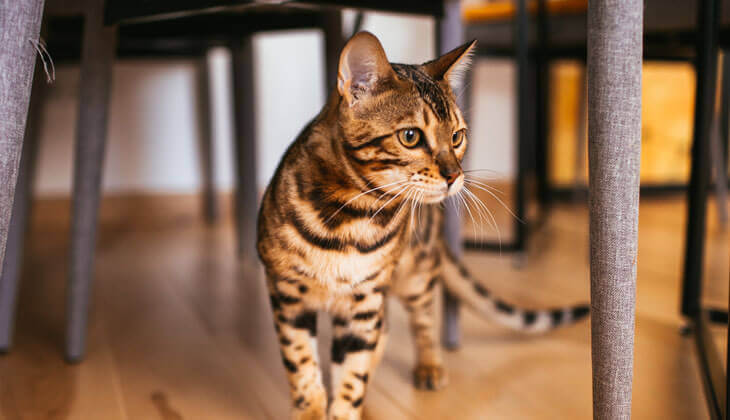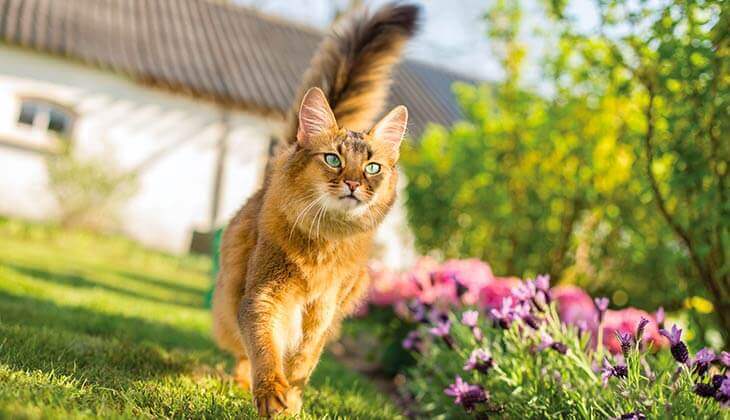Keeping Your Home Safe for Your Indoor Cat
CATS
28 May, 2021
READ 5 minutes

When you share your home with a cat, there are the essential things to consider – litter box, nutritious food, toys to keep him or her mentally stimulated and, of course, having your local veterinarian on speed dial. But it is equally important to remember that your cuddly feline friend is the descendent of wild cats and as such, still retains those genetic instincts to hunt, stalk prey, climb and chew. With that in mind, your home should be a safe environment for your adventurous friend, who could find real dangers in the most unlikely spots.
Here are some things to consider to make your home as safe as possible for your furry companion:
WINDOWS, DOORS AND BALCONIES
Your cat loves to sit in the window and look out at the world, but if that window is left open, even a little, he or she can easily slip through and escape. Or worse yet, your cat could get stuck trying to squeeze through the narrow gap, resulting in injuries referred to by veterinarians as “window trauma.” These injuries are often in the hind-limbs, and can sometimes result in paralysis.
Windows on high floors pose a danger for obvious reasons. If your cat falls out of that window, they could suffer significant injuries, including head trauma. The same is true for balconies, which your adventurous feline might enjoy, but even the most agile kitty can sometimes fall.
Doors present similar dangers – if left open, they are an easy escape route, and if left ajar, there is danger of them slamming and causing real physical harm to your four-legged friend.

BATHROOMS
It’s probably obvious that you wouldn’t want your cat to ingest any pills or medicines, but it can take as little as ibuprofen or acetaminophen to kill a kitten. Drain cleaners and razors are extremely dangerous as well. You will also want to make sure toilet seats are closed, as some cats are drawn to water.
THE KITCHEN
Make sure cabinets holding cleaners are always closed and that garbage cans are inaccessible. Plastic wraps and certain foods containing additives are also dangerous for your cat. All of these things pose choking or potential poisoning hazards for your cat.
Some cats like to tread around on countertops and around the stovetop. Not only is there a danger of your cat getting burned on an open flame, but items left on the counter, such as knives, can be extremely dangerous as well. It’s best to train your kitty not to jump up onto these counters at all by finding constructive ways to deter the behaviour. One suggestion is to leave placemats covered in double-sided tape on the countertops when you’re not using them. Cats hate walking on sticky surfaces and after a while, your cat may get the hint.

LAUNDRY ROOM
Soap pods can look a lot like little treats or toys to your cat, but they can be lethal if ingested. Keep them and other cleaning products stored away. Also, be sure to double check your washing machine or dryer before closing the door. Cats love confined spaces and have been known to sneak into a laundry machine for a little snooze.
OTHER THINGS TO CONSIDER
- Uncovered electrical outlets and wires. These can cause a shock if your cat decides to lick or chew on them. Loose wires can also topple lamps and appliances if pulled. Consider tacking them to the floor.
- Hanging cords for blinds. Cats love to climb everything, but these are especially dangerous, as they pose a risk for strangulation. You should check for anything else that might be long and hanging, such as tablecloths or strings.
- Knick-knacks. Small items like rubber bands and paper clips are a choking hazard if left in a place where your cat might try to nibble on them.
- Unstable furniture. Items such as bookcases can topple over if your cat decides to hang from them.
- Doors, windows and fireplaces. You should make sure these are secured and shut so your cat can’t escape or have an accident.
- House plants and cut flowers. Not all plants and cut flowers are “cat friendly.” The ASPCA has an extensive list of plants that are toxic and non-toxic to your cat, which you can consult to be safe.

It is important to remember that while you want to keep your cat safe in your home environment, you don’t want to scold or punish your kitty for behaviour that is actually innate for him or her. Many people use spray bottles or cans filled with coins to scare their cats for climbing or jumping on furniture, but punishing your cat will only diminish your relationship with your cat because you will instill in your cat a fear of you – not the behaviour. For this reason, finding creative deterrents, keeping your kitty mentally stimulated, safe and happy, are the most effective measures.







